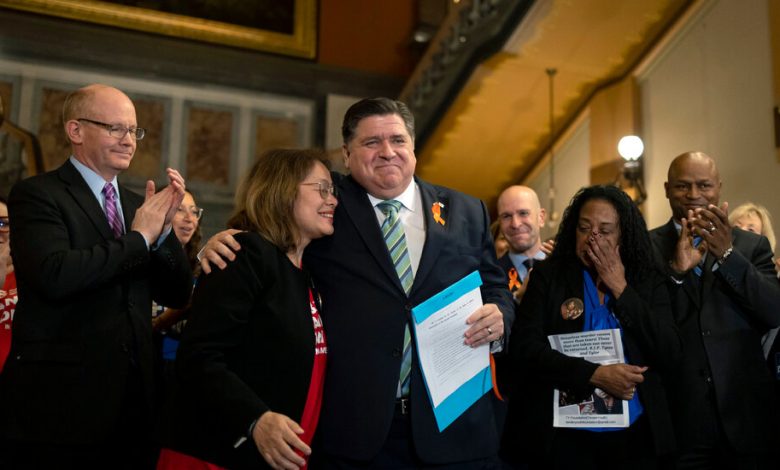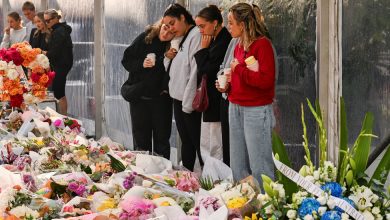Illinois Passed a Sweeping Ban on High-Powered Guns. Now Come the Lawsuits.

CHICAGO — When Illinois legislators passed a far-reaching ban last week on selling certain high-powered guns and high-capacity magazines, the Democrats who run the state celebrated it as a lifesaving law that would help prevent mass violence. But on Friday, in the law’s first judicial test, a state judge in Effingham County temporarily blocked it from being enforced against hundreds of people and several gun dealers who sued.
That ruling, a preliminary step and one of several legal tests the law is likely to face, came amid broad uncertainty about whether sweeping gun controls like those in Illinois can withstand judicial scrutiny following a Supreme Court decision in a New York case last year.
Within days of Gov. J.B. Pritzker signing the Illinois legislation, at least three lawsuits were filed challenging it in state and federal courts. Though the case in Effingham County, a conservative area east of St. Louis, focused on claims that the law violated the Illinois Constitution, two other lawsuits, in Federal District Court in Southern Illinois and in state court in rural Crawford County, included Second Amendment arguments that invoked the Supreme Court’s New York ruling. The judge in Effingham County, Joshua Morrison, also mentioned the New York case in his ruling on Friday granting a temporary restraining order.
“The big picture is just a lot of uncertainty and a lot of unpredictability until there is agreement on some kind of way to apply” the ruling from last year’s Supreme Court case, said Andrew Willinger, the executive director of the Center for Firearms Law at Duke University.
In that case, New York State Rifle & Pistol Association v. Bruen, the court found that Americans have a broad right to arm themselves in public and struck down a New York law that placed strict limits on carrying guns outside the home. The decision, in which the court’s six conservative justices were in the majority and its three liberal justices dissented, has led to a wave of litigation and legislation nationwide. Judges and lawmakers have disagreed on how to apply the new precedent, and activists on all sides of the gun debate have strained to find where the new lines are.
Gun Violence in America
- Red Flag Laws: Judges in 19 states and the District of Columbia are now empowered to issue orders to keep guns out of the hands of people deemed dangerous.
- Boosting Security: New federal data offers insight into the growing ways that schools have amped up security over the past five years, as gun incidents on school grounds have become more frequent.
- Firearm Accessories: The Biden administration said that it would crack down on the sale of firearm accessories used to convert short-barreled semiautomatic weapons into long rifles.
- In New York: The Supreme Court rejected a request from firearms dealers to block parts of recent state laws, days after it turned down a request to block other provisions of one of the laws at issue.
Mr. Pritzker said the ruling on Friday was disappointing but “not surprising,” and expressed confidence that the law would ultimately be upheld. The office of Attorney General Kwame Raoul said it would appeal.
Even before its new weapon ban, Illinois had the most extensive gun restrictions in the Midwest, including a requirement that residents be licensed by the State Police to own firearms. But legislators were spurred to go further after a gunman killed seven people and wounded dozens of others with a high-powered rifle at a Fourth of July parade last year in Highland Park, a Chicago suburb that had been at the center of a court fight over its municipal ban on certain weapons.
The new state law, which took immediate effect, made Illinois one of nine stateswith some form of what advocates call an assault weapon ban, according to the Giffords Law Center, which supports gun restrictions. Under the new Illinois rules, a long list of specific types of semiautomatic weapons, including AR-15-style rifles, are no longer allowed to be sold to residents, and people who currently own them were given a deadline to register them with law enforcement.
Though supporters of the law acknowledged the limits of legislating weapon sales on a state-by-state basis — Illinois borders several states with loose gun laws, contributing to its long-running struggles with violence — they said the new legislation would still have an impact. Congressional Democrats have attempted to restore a national ban on assault weapons, but have been blocked by Republicans.
“It does matter to have these laws in place, to have restrictions in place,” said Ari Freilich, the state policy director at Giffords, who said the Illinois law would put gun sellers on notice and help lessen the risk of high-casualty mass shootings.
Gun rights supporters, however, were incensed, calling the law an unconstitutional overreach that exposed responsible gun owners to criminal charges and banned the sale of common firearms.
“The boot heel of government has been placed squarely on the neck of freedom-loving Illinois citizens,” Richard Pearson, the executive director of the Illinois State Rifle Association, said in a statement. His organization is a plaintiff in the federal lawsuit, which has been assigned to a judge who was appointed by President Donald J. Trump.
Though Democrats control state government in Illinois, thanks largely to their dominance around Chicago, conservative Republicans run local governments throughout much of the state. Many Illinois sheriffs said they would not prioritize enforcing the law’s gun registration rules and did not plan to arrest people solely for violating that requirement.
Sheila Simon, a law professor at Southern Illinois University who once served as the state’s Democratic lieutenant governor, said those statements underscored the geographic and political divides within Illinois.
“A county cannot opt out of state laws,” Ms. Simon said. “So when sheriffs say they’re not going to enforce a state law, I hope that what they mean by that is that they’re going to be part of a lawsuit to challenge the law.”
Farrah Anderson contributed reporting.




